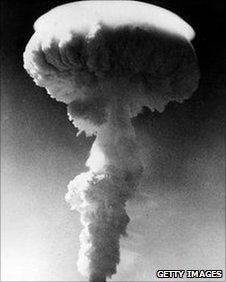MoD wins appeal over damages for atomic test subjects
- Published

Nuclear testing was carried out on Christmas Island in the South Pacific
The Ministry of Defence has won its appeal against a decision to allow veterans who took part in nuclear tests to claim damages.
Ten of the 1,011 ex-servicemen launched test cases against the MoD, blaming atomic experiments in the South Pacific in the 1950s for their ill health.
But judges say nine cases - which the MoD opposed - were launched outside the legal time limit and cannot proceed.
They also said they had no evidence to show the tests were to blame.
At the height of the Cold War in the 1950s, Britain carried out a series of nuclear weapons tests in mainland Australia, the Montebello Islands off the west Australian coast and on Christmas Island in the South Pacific.
The men involved want compensation for illnesses - including cancer, skin defects and fertility problems - which they claim are the result of exposure to radiation.
'Dead or untraceable'
The MoD has acknowledged its "debt of gratitude" to them, but denies any negligence.
It has also argued that the cases could not proceed because more than 90% of the 114 essential witnesses responsible for the planning and execution of the tests were dead or untraceable.
Lady Justice Smith, Lord Justice Leveson and Sir Mark Waller, sitting at the Court of Appeal, ruled on Monday that only the case of the late Bert Sinfield - which the MoD had not opposed - was entitled to proceed to trial.
The rest were time barred - ruled out because they were outside the legal time limit - and the judges said they had declined to use their discretion to allow them to proceed because they could see no evidence by which the veterans could hope to prove that their illnesses had probably been caused by radiation exposure.
Lady Justice Smith said: "We have no doubt that it will appear that the law is hard on people like these claimants who have given service to their country and may have suffered harm as a result.
"No doubt partly with this background in mind, Parliament has provided that servicemen who have been exposed to radiation which might have caused them injury will be entitled to a war pension.
Supreme Court
"Of course, a war pension is not as financially beneficial as common law damages but it is some compensation.
"Of particular importance on this issue, on an application for a war pension, the burden of proving causation is reversed; thus, the MoD has to exclude the possibility that the applicant has been harmed by radiation."
Solicitor Neil Sampson, for the veterans, said after the ruling that he expected to take the case to the Supreme Court.
"This is so that the nine claimants who the court has said are time barred can proceed together with any others in the claimant group who may fall within the same categories as those the court has barred," he said.
Mr Sampson has previously urged the government to settle the case out of court.
The US has awarded compensation under the Radiation Exposure Compensation Act to veterans, including at least one Briton, involved in nuclear testing in the 1960s.
The Minister for Defence Personnel, Welfare and Veterans, Andrew Robathan, welcomed the judges' decision.
"While I have tremendous sympathy with anyone who is ill, the court accepted arguments that the general merits of the claims were extremely weak and said that the claimants had produced no evidence to link illnesses with attendance at the nuclear tests," he said.
"We recognise the invaluable contribution of all service personnel who took part in the nuclear testing programme. We are grateful to them for the part they played in ensuring UK security.
The court also dismissed the MoD's appeal against Mr Justice Foskett's refusal in the High Court to strike out the claims or give summary judgement in its favour.
- Published22 November 2010
- Published22 November 2010